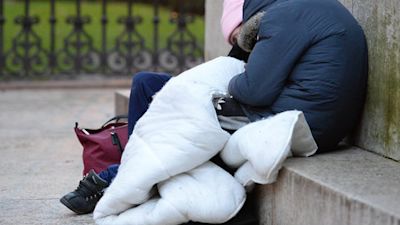Thousands in the South West made homeless by coronavirus crisis

More than 20,000 families in the South West were made homeless or threatened with losing their homes during the coronavirus pandemic.
The latest figures released by the Ministry of Housing, Communities & Local Government revealed the number of households in the region that asked their local authorities for help, between April and December 2020.
This was because they had either been made homeless or were close to losing their home during the Covid-19 crisis.
When someone is at risk of homelessness, local authorities have a 'prevention duty' in which they have 56 days to try and prevent that person from losing their home.
If prevention fails, a 'relief duty' is owed to help the homeless household or individual resolve their situation and seek help. Councils are expected to take reasonable steps to secure accommodation for someone classed as homeless.
In Bristol, more than 2,000 households were eligible for this support between April and December 2020. Of those, more than 82% were already homeless and needed help to find emergency shelter or other accommodation.
Households homeless or at risk of losing their home (April - December 2020)
Devon - 5,753
Somerset - 2,590
Gloucestershire - 2,585
Cornwall - 2,330
Bristol - 2,039
Wiltshire - 1,804
Dorset - 936
*Somerset West and Taunton Council did not provide figures for the period April-June so this figure is likely to be higher.
The main causes of homelessness across the whole of the UK include family or friends no longer being able to accommodate, the end of private rental assured shorthold tenancies, and domestic abuse.
Other reasons include eviction from supported housing, requirement to leave asylum support and a non-violent relationship breakdown.
The figures also reveal that at the end of last year 3,640 households in the South West were living in temporary accommodation - which could include B&Bs or hostels.
Of those, 780 were single women with dependent children.
'I fear being on the streets' - homeless people 'frightened' as support due to end
Homelessness on the rise in the South West but falling elsewhere
Socially distanced pods built for the homeless in Weston-super-Mare
Last summer the Government introduced a ban on evictions as a result of the Covid crisis, which stopped landlords in England from using bailiffs to evict tenants and required them to give at least six months' notice of court action.
It ended on 31 May, prompting urgent warnings from homelessness charities about the number of people that faced returning to the streets.
The Government said it has allocated "an unprecedented £750 million" into tackling homelessness and rough sleeping by the end of this Parliament.
One of its most recent announcements as part of this was £203 million for local councils across England to help fund shelters, specialist mental health and addiction services, and offer targeted support to help get people off the streets permanently.
"At the beginning of the pandemic we took swift and decisive action to bring rough sleepers in from the streets and settled them into longer-term accommodation in record numbers," said Housing Secretary Rt Hon Robert Jenrick MP.
"Ending rough sleeping is a personal mission for the Prime Minister and me – and we have made huge progress since he came into No.10, reducing rough sleeping by 43%.
"To build on this progress, we are making the biggest ever investment under the Rough Sleeping Initiative to provide vital services to those who need it most, as part of our drive to end rough sleeping for good."
However, homeless charity Shelter said: "To say the last year has been difficult for homeless families is a gross understatement, it’s been atrocious.
"Months of lockdown and school closures spent in cramped, shoddy temporary accommodation with no space to learn or work, and often without access to basics like the internet or a washing machine.
"The economic impact of the pandemic has exposed the true cost of decades of failure to build the social homes we need.
"More than 60,000 households were tipped into homelessness last winter – even with the evictions ban.
"Despite the clear danger that homelessness will rise, the Government remains focused on expensive home ownership schemes, rather than anything resembling truly affordable housing.
"If the Government wants this country to recover quickly from the pandemic, investing in a new generation of secure social homes is an absolute must.”
Read more: